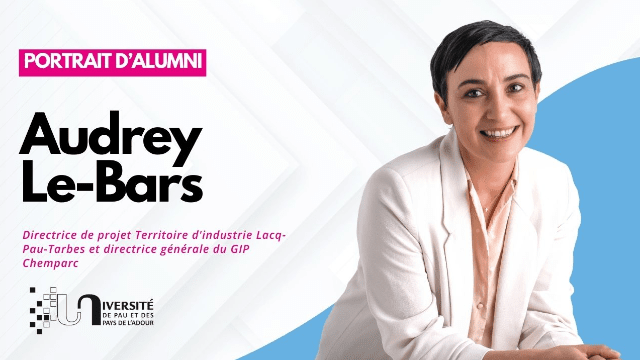Audrey Le-Bars, Director of the Lacq-Pau-Tarbes Region of Industry project and Managing Director of the Chemparc public interest group
In 2003, after a Master's degree in Geography at the University of Bordeaux Montaigne, Audrey Le-Bars completed a DESS (Specialised Higher Education Diploma) in Territorial Planning and Development at UPPA, when she fell in love with the Pyrenees.
Why geography?
After my Baccalaureate in 1998, I hesitated a lot between geography and political science. I was really interested in the “public sphere”. I had a vague ambition of going into a profession that would allow me to contribute to local dynamism. In the end, I opted for geography, which offered a more open and diverse programme. During the first few years, I studied urban, rural and agricultural geography... It was fascinating! I was learning about physical geography, which is very concrete, and gaining a better understanding of the interactions between people and their environment. I’m originally from Bordeaux and I did two years at the University of Bordeaux Montaigne (DEUG (General University Diploma) in Geography), followed by a Bachelor's degree at the University of Toulouse II-Le Mirail and then a Master's back in Bordeaux, which included a study and research project on ski resorts in the Pyrenees based on a “four-season mountain” vision that was a bit avant-garde at the time! When it came to choosing a DESS and a career path, I looked at courses at universities in the South-West. The DESS at UPPA really grabbed my attention. It was the one that best met my aspirations, namely to understand the public mechanisms that allow the implementation of coherent territorial strategies and imagine a future that makes regions attractive in the long term.
What memories do you have of UPPA?
It’s got a strong appeal and is very people-focused, with strong connections in the local area. During the Territorial Planning and Development DESS, a lot of guests from government departments and local authorities (legal specialists, economic development managers, investigating commissioners, etc.) contributed to the course. These close ties between the University and the local area was also reflected in the work carried out in the research laboratories, the internships and the dissertation topics proposed by the lecturers... I saw UPPA as a place for reflection and a factory of new ideas for the Pyrenees. For us students, it was an opportunity to discover the realities of the field and build up a network. After my DESS, I was hired as Head of the Housing and Land Unit within the Pyrénées-Atlantiques Departmental Council following a 6-month internship I’d done. I was there for eight years.
What was your career path after that?
After this first very macroeconomic job, I wanted to tackle more operational issues. In 2009, I joined the town of Aurillac (Cantal) as Director of Town Planning, Land and Urban Renewal, then in 2015 I was appointed Director of Urban Development and Attractiveness at the Bassin d'Aurillac Community of Towns. I've been involved in several key projects: a cinema, an eco-neighbourhood, urban regeneration under the ANRU scheme, etc. I've greatly enhanced my skills in public policy (budget, regulations, calls for tender, etc.). In 2016, I started to miss the Pyrenees. The Tarbes-Lourdes-Pyrénées urban community was looking for an Economic Development, Research and Innovation Director, so I applied and got the job! Three years later, in 2019, I took charge of the Lacq-Pau-Tarbes Region of Industry project. Since January 2024, I've also been managing the Chemparc public interest group. My two hats have the same objective: reindustrialise the local area and create sustainable jobs. I'm working on the ways to attract new industrial companies to the region: low-carbon strategy, training, skills, acceptability, innovation, attractiveness... It’s a great challenge!
What words do you spontaneously associate with UPPA?
Innovation - UPPA is constantly reinventing itself. The I-SITE accreditation obtained in 2022 puts it on a par with the biggest French universities.
Local - the connections between the courses and the area is part of UPPA's DNA.
Openness - despite its small size, this university has a very international outlook and has many foreign students of all nationalities.
What advice would you give to a young person starting a course at UPPA?
I’d like to reassure anyone who is hesitating about choosing geography. It's an exciting field with a great number of connections to other areas geographers' insights are increasingly needed to understand the world of today and build the world of tomorrow. There are a wide range of career opportunities, from teaching to town planning, cartography, consultancy, local development, tourism, the ecological and energy transitions... Geography is perfectly suited to anyone who wants a career with meaning.
Want to find out more?
Master's Degree in Geography, Planning, the Environment and Development at UPPA
Lacq-Pau-Tarbes Region of Industry Chemparc

Comments0
Please log in to see or add a comment
Suggested Articles


